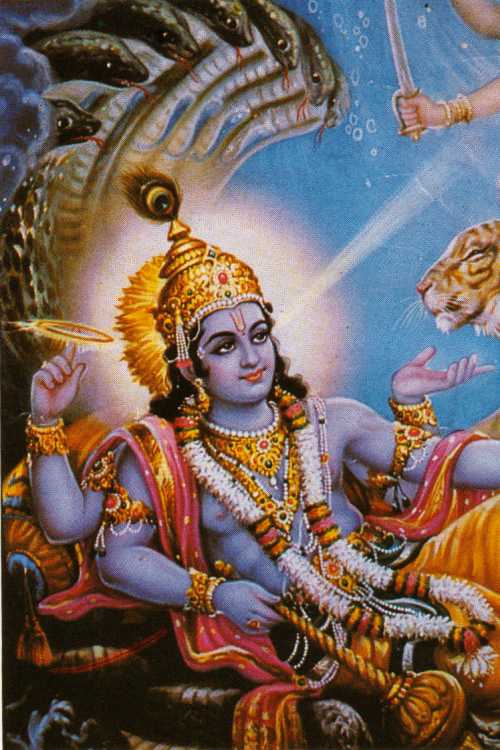| HINDUISM |
 |
You Can Have What You Want:
(Huston Smith's interpretation of the fundamental meaning of Hinduism)
1) Pleasure
"If pleasure is what you want, seek it intelligently"
Pleasure is viewed as a positive, legitimate desire in Hinduism
However, it does not satisfy completely b/c it is too privatized and fleeting
2) Worldly Success
Wealth, fame, and power
Like pleasure, worldly success is also viewed as a positive desire
However, it likewise does not completely satisfy for the following reasons:
1. Competitive and Precarious (One's success come's at the
expense of anothers)
2. Insatiable ("Poverty consists not in the decrease
of one's possessions, but in the increase of one's greed")
3. Self-Centered
4. Ephemeral
3) Duty/Service
Allows for respect and gratitude
However, it is also limited b/c community is finite, and no matter how
dutiful you are, the community can never be perfected, duty can never be
finally fulfilled or satisfied.
4) Liberation
The true and ultimate desire of all human beings
Absolute Being, Absolute Knowledge, Absolute Joy
[The first two paths (Pleasure and Worldly Success) are Paths of
Desire. The second two are Paths of Renunciation.]
Life's Fundamental Limitations:
1) Limitations on Joy
Physical Pain (can be remedied through medicine and science)
Frustrated Desire/Psychological Pain (can be remedied through detachment
from desire)
Boredom/Spiritual Pain
2) Ignorance
Can be remedied through wisdom ("knowing of That the knowledge of which
brings knowledge of everything")
3) Finitude/Restricted Being
Can be remedied by moving beyond our fixation on the present
Four Paths of Yoga:
(Religion treated not as a belief, but as a technique)
Yoga -- "method of training designed to lead to integration
or union"
1st Step is to cleanse oneself of impurities
2nd Step is to cultivate habits such as non-injury, truthfulness, non-stealing,
self-control, cleanliness, contentment, self-discipline, compelling
desire.
1) Jnana Yoga (knowledge)
the path to oneness with the Godhead through knowledge
an intuitive discernment that transforms the knower ("to know the good
is to do the good")
Key = Discrimination
1. Learning factual truth
2. Thinking -- move from factual truth to reflective truth, from
concept to realization
3. Detachment -- to distinguish between the infinite self (atman)
and the transient finite self; to move from self-identification and self-concern
to identification with Being as a whole, and a concern
for All
2) Bhakti Yoga (Love)
the path to the Godhead through Love
the most popular of the four paths of Yoga
powered by the emotions rather than reason
Begins with the insistence on God's otherness or transcendence
Goal is not identification with the Godhead (as in Jnana Yoga), but adoration
of God
God is thought of not as an impersonal ground of Being or as a concept,
but instead, as being personal with distinct attributes
Two General Approaches of Bhakti Yoga:
1. Japam -- the meditative practice of repeating God's name
2. Ishta -- adopted a form or particular embodiment of the divine
3) Karma Yoga (Work)
the path to the Godhead through work
4) Raja Yoga (Psychophysical)
"the royal road to reintegration"
practicing prescribed mental exercises and observing their subjective/spiritual
effects
Eight Steps
1. Five Abstentions (injury, lying, stealing, sensuality, greed)
2. Five Observances (cleanliness, contentment, self-control, studiousness,contemplation)
3. Asanas (postures) -- for example, the lotus position
4. Mastery of Respiration
5. No Sense Bombardments
6. Concentration (to focus the mind on one thing only)
7. Meditation (the duality of the knower and the known, or of the subject
and the object is resolved into a complete unity)
8. Samadhi (complete absorption into God, all forms pass away, to think
no-thing)
Four Stages of Life:
-
Student
-
Householder
-
Retirement
-
Sannyasin
Four Castes in Society:
-
Brahmins (seers) -- intellectual and spiritual leaders
-
Kshatriyas -- administrators
-
Vaishyas -- producers and workers
-
Shudras -- followers or servants [Untouchables]
Hindu 'Theology':
1st Rule: to learn what to leave out (neti . . . neti)
Brahman -- Hindu name for the supreme reality
Nirguna Brahman -- God without attributes
Saguna Brahman -- God with attributes
Brahma -- Creator God
Vishnu -- Preserver God
Shiva -- Destroyer God
Hindu Anthropology:
Jiva -- individual soul
Body is thought of as a garment or a shelter ("Worn-out garments are shed
by the body; worn-out bodies are shed by the dweller")
Samsara -- reincarnation, transmigration of the soul
Karma -- moral law of cause and effect; the absolute governing principle
in both
spiritual and material matters
1. Complete Moral Responsibility -- everyone gets exactly what they
deserve
2. No such thing as Luck or Chance
Atman -- the animating force within each individual
Hindu Cosmology:
-
Just World ruled by Karma
-
Middle World -- training ground for human spirit
-
Metaphysically world is not self-existent, world is grounded in a more
fundamental reality
-
Maya -- world is illusory
-
Lila -- world is play

